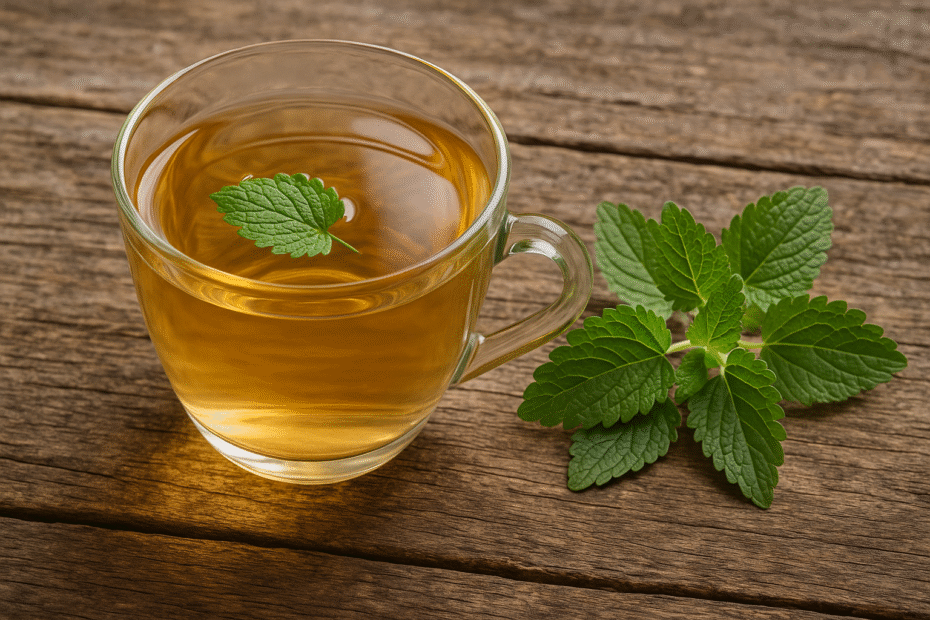Lemon balm (Melissa officinalis) is a fragrant herb in the mint family that has been used for centuries to soothe the nervous system, enhance mental clarity, and support better sleep. Whether taken as a tea, tincture, or supplement, lemon balm offers a gentle, effective way to manage stress and boost your well-being—naturally.
In this article, we’ll explore the science-backed benefits of lemon balm and show you how to use it for calm, focus, and restful sleep.
What Is Lemon Balm?
Lemon balm is a perennial herb native to Europe and the Mediterranean. It grows easily in gardens and pots, producing lemon-scented leaves that are rich in antioxidants, terpenes, and polyphenols.
Traditionally used in herbal medicine to calm the mind and digestive system, lemon balm has now gained recognition in clinical research for its nootropic and sedative properties.
The National Center for Complementary and Integrative Health (NCCIH) notes that lemon balm is generally safe and has shown positive results in several small-scale studies.
1. Stress Relief and Calm
Lemon balm is widely known for its anxiolytic (anti-anxiety) effects. It helps regulate mood and reduce nervous tension.
✅ How it works:
- Increases GABA activity in the brain, which helps calm overactive neurons
- Reduces cortisol, the stress hormone
- Promotes a general sense of relaxation
🔬 Research:
A 2004 study published in Psychosomatic Medicine found that participants taking lemon balm extract reported improved mood and increased calmness compared to a placebo group.
2. Improved Focus and Cognitive Function
Lemon balm doesn’t just calm—it also sharpens the mind. It’s been shown to enhance memory, attention, and mental clarity, especially when combined with other nootropics.
✅ How it helps:
- Supports alertness without overstimulation
- Improves working memory
- Increases mental performance under stress
🔬 Research:
A 2014 study in Nutrients found that lemon balm improved cognitive performance and working memory in young adults after a single dose.
Source: Nutrients Journal
3. Promotes Restful Sleep
Lemon balm is frequently used in natural sleep remedies, often in combination with valerian root or chamomile.
✅ Sleep-enhancing effects:
- Helps you fall asleep faster
- Reduces nighttime restlessness
- Improves sleep quality without causing drowsiness the next day
🔬 Research:
A 2011 clinical trial published in Mediterranean Journal of Nutrition and Metabolism found that lemon balm significantly improved sleep disorders in children when combined with valerian.
Study Summary via Healthline
How to Use Lemon Balm
Lemon balm is versatile and easy to integrate into your wellness routine:
| Form | How to Use | Ideal For |
|---|---|---|
| Tea | Steep 1–2 tsp dried leaves in hot water for 10 mins | Daily calm and sleep support |
| Tincture | Take 1–2 droppers under tongue or in water | Fast-acting stress relief |
| Capsules | Follow label dosage | Consistent focus and mood |
| Essential Oil | Diffuse or apply diluted to temples | Aromatherapy for relaxation |
⚠️ Always consult a healthcare provider before use if you are pregnant, nursing, or taking thyroid medication.
Conclusion: A Gentle Herb for Daily Balance
From calming frazzled nerves to improving mental focus and promoting quality sleep, lemon balm is a gentle yet powerful herb backed by both tradition and science. Its versatility and low risk of side effects make it a smart addition to any wellness toolkit.
Try it today in the form that fits your lifestyle—whether as a tea in the evening, a capsule before a busy day, or a tincture for on-the-go calm.
Frequently Asked Questions (FAQ)
1. Is lemon balm safe for daily use?
Yes, most people can use it daily, but moderation is key. Stick to recommended doses.
2. Can lemon balm make you sleepy during the day?
No, when used properly, it relaxes without causing sedation—unless taken in high doses.
3. Is lemon balm safe for children?
Yes, especially as tea or glycerin-based tinctures. Always check with a pediatrician first.
4. Can I grow lemon balm at home?
Absolutely! It’s easy to grow in pots or garden beds and thrives in full to partial sun.
5. Does lemon balm interact with medications?
It may interact with sedatives or thyroid medications. Consult a healthcare provider if in doubt.
